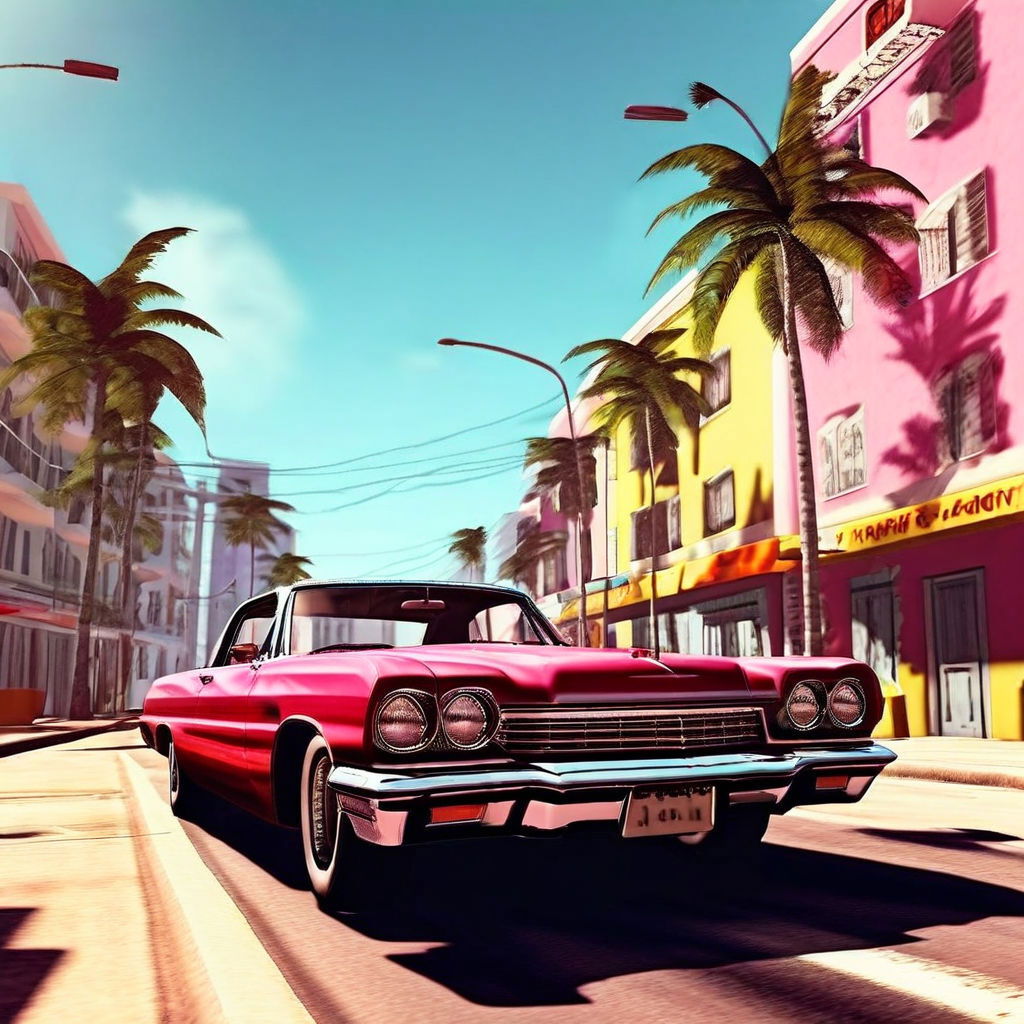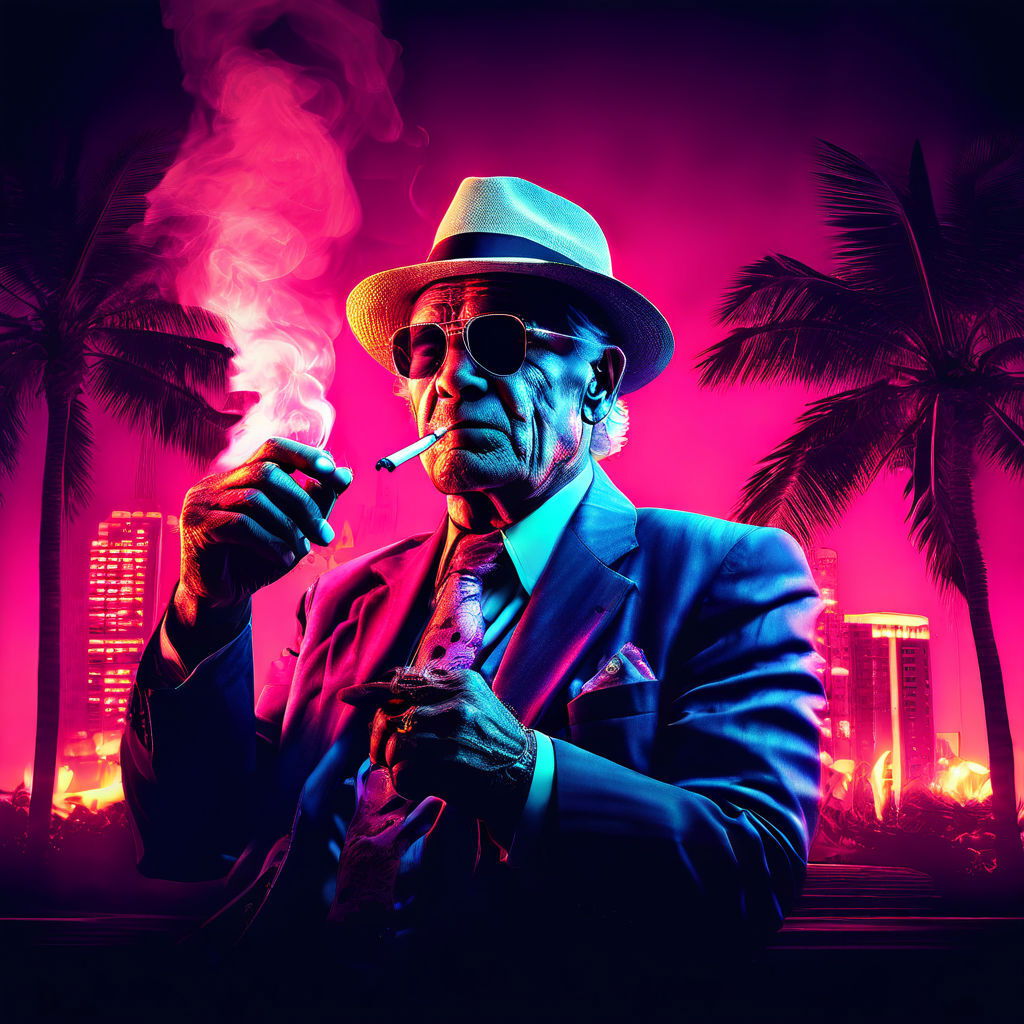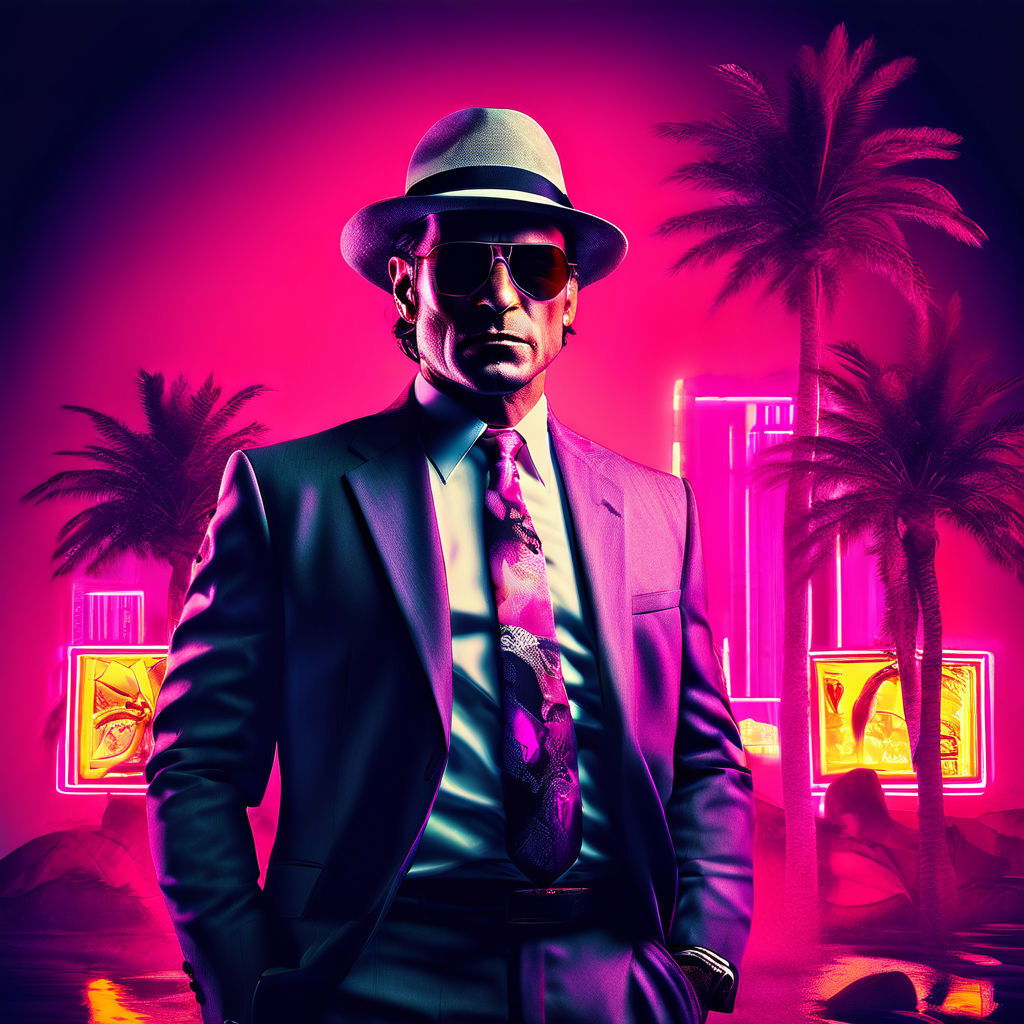dios fellas : The Cosmic Mobster
A STORY BY TEGEDAO ABOUT TOMMY MUTTI THE DIVINE DON
Prologue:

In the sunlit embrace of Florida, where the dazzling allure of ocean waves meets the relentless ambition of its people, a saga of power and shadows begins to unfold. This is a land where the sun casts long shadows, and those shadows hide secrets only whispered in the dark corners of power.
The year was 1954 when Santo Trafficante Jr. ascended to the throne of the Cigar City Mafia, an inheritance wrought through the bloodline of organized crime. Born in Tampa, 36 years prior, into a dynasty carved by his father, Trafficante Jr. inherited not just a name but an empire that spanned beyond the shores of Florida to the bustling casinos of Cuba. His dominion was built on more than just the vice and violence typical of Mafia families; it was an intricate web of legal fronts and illicit dealings.
Trafficante's reign took an unexpected turn in 1959 when Fidel Castro's revolution swept through Cuba, uprooting Mob operations in Havana and temporarily imprisoning him. It was during a fateful incarceration that Trafficante crossed paths with Dallas mobster Jack Ruby, a meeting that would reverberate through the annals of history. Following his deportation, Trafficante entwined his fate with the CIA in plots to assassinate Castro, driven by a fury over John F. Kennedy’s failure to reclaim Cuba. His prescient declaration in 1962 that JFK would meet his end by an assassin's bullet marked him, yet investigators post-1963 assassination never regarded him as a viable suspect.
Though Trafficante never expanded his rule to encompass Miami, considering it an open city by the Syndicate’s decree, he established robust drug-smuggling routes from South America through Florida. Among his lasting legacies was the creation of the Tampan language, a unique blend of Spanish and Italian spoken primarily by the local gangsters since the 1950s.
By the 1960s, a new force began to rise in the underworld of Miami, under the enigmatic leadership of Tommy Mutti, a notorious figure within the Dios Fellas. Speaking the Tampan language and referring to Miami as Vice City, Mutti harbored a profound secret that transcended the typical machinations of crime.
Tommy Mutti's journey was shaped by a deep spiritual awakening triggered by his turbulent upbringing in Vice City. He had tapped into a universal consciousness, a force he called the DIOS Force, where every query, big or small, was instantly understood and addressed. It was through this understanding that Mutti's influence expanded exponentially, blending his criminal endeavors with a doctrine that transcended the physical realm.
As Mutti ascended, his very persona vibrated with a stream of ruthless determination and cunning that answered every wish and countered every threat. His acceptance of his darker nature marked him not just as a gangster, but as a philosopher of the underworld, one who embraced the shadowy reflection of his own soul.
As the leader of the Dios Fellas, Tommy Mutti’s reign over Vice City's underworld began in the swinging sixties and stretched into the roaring eighties, marked by a booming cocaine trade that secured his status as an untouchable figure akin to a shadow mayor.
The argument that organized crime was a myth had long been debunked as scholars, law enforcement, and historians delved deeper into the sophisticated networks that shaped nations. As the 20th century waned and gave way to the new millennium, the definition and perception of criminal societies were forever altered.
Tommy Mutti, much like Trafficante before him, succumbed to heart issues in the nineties, yet his legacy and the echo of his mantra, "By any means necessary," continues to resonate through the streets of Miami. In Vice City, where the Dios Fellas rule, the belief that one can rise above any circumstance if only they embrace the limitless possibilities of the universe remains unshaken. In this city, as in the rest of Florida, the sun never truly sets; it only dips below the horizon to rise again, bringing light to new empires waiting to be built.
Chapter 1: The Legacy of Cigar City

Tampa, Florida, 1954. The pulsating heart of Ybor City, once a thriving hub for immigrants seeking the American Dream, had transformed into a battlefield for power and influence under the shadow of the Cigar City Mafia. At the center of this clandestine empire stood Santo Trafficante Jr., a man born into a legacy of whispered secrets and silent agreements.
The story of Santo Trafficante Jr. began on a hot, sticky day in Tampa, 36 years prior. His birth into the Trafficante family was not just a continuation of a bloodline but the start of a meticulous grooming process for a life of power. His father, Santo Trafficante Sr., was a towering figure in the Florida underworld, known for his shrewd business acumen and ruthless enforcement of loyalty.
As a child, Santo Jr. watched his father navigate the complexities of running both legitimate businesses and illicit operations, a duality that defined their family's public persona. By the time he was a teenager, Santo Jr. had learned more about loyalty, betrayal, and power than most men knew in a lifetime. His education was not limited to books; it came from hushed conversations in the back rooms of nightclubs and smoke-filled meetings in quiet, upscale restaurants.
The death of Santo Sr. in 1954 was sudden—a heart attack in the middle of the night that left the family and their associates reeling. Santo Jr., at the age of 36, found himself at the helm of the Cigar City Mafia much sooner than he had anticipated. The weight of his inheritance was immense, encompassing a network that extended from the sunny streets of Tampa to the bustling casinos of Havana.
Taking control of such a vast empire required not just strength but an acute understanding of the delicate balance of power. Santo Jr. moved quickly to consolidate his position, reassuring old allies and swiftly dealing with any hints of dissent. His approach was more calculated and reserved than his father’s, favoring silent maneuvers over open confrontation.
Cuba in the 1950s was a paradise for anyone with cash and connections, and Santo Jr. capitalized on both. He expanded the family’s operations into Havana, investing in casinos and nightclubs. These establishments became hotspots for tourists and a front for laundering money. The glittering Cuban nightlife masked the gritty realities of the Trafficante’s operations, providing cover for drug trafficking and other illegal activities.
However, Santo Jr.'s ambitions in Cuba faced an unprecedented challenge with the rise of Fidel Castro and his revolutionary forces. The 1959 revolution was swift and brutal for those in the Mob’s pocket. Santo Jr. was among the many who underestimated Castro, a mistake that cost him dearly. His lucrative Cuban empire crumbled almost overnight, and he found himself imprisoned in a stark Havana jail.
During his brief incarceration, Santo Jr. had a fateful encounter with Jack Ruby, a Dallas mobster with his own set of connections. Their meeting, shrouded in secrecy, would later fuel endless speculations after Ruby’s infamous assassination of Lee Harvey Oswald. Shortly after, under mysterious circumstances and perhaps owing to Ruby’s intervention, Santo Jr. was deported back to the United States.
He returned to Tampa changed, hardened by the loss and betrayal he had experienced. Yet, his resolve to rebuild and expand his empire was fiercer than ever. The lessons learned in Cuban jails would redefine his strategies; no longer would he underestimate an opponent, nor would he allow his operations to depend so heavily on the whims of political tides.
Santo Jr.'s return marked a new era for the Cigar City Mafia. He diversified the family’s interests, steering them into new ventures and reinforcing old ones, always with an eye toward the future. As he rebuilt, the shadow of his father loomed large, a reminder of the legacy he was bound to uphold—a legacy built on power, secrecy, and an unyielding grip on the underworld of Florida.
Chapter 2: The Rise of Tommy Mutti

Miami, the 1960s. The city pulsed with a vibrant energy, its glamorous beaches and booming nightlife concealing a dark undercurrent of organized crime. Here, in the shadows of the burgeoning metropolis known as Vice City, Tommy Mutti emerged as an audacious figure in the Dios Fellas—a gang that would soon command the city's underworld with an iron fist.
Tommy Mutti was born into hardship in the rough neighborhoods of Vice City. The streets were both his playground and his school, teaching him the harsh realities of life from a young age. His parents, Italian immigrants, struggled to make ends meet, leaving Tommy to fend for himself and his younger siblings most days. The need to survive in a tough world drew him into the local gangs as a teenager, where he quickly learned the value of loyalty, power, and fear.
Tommy’s natural charisma and sharp intellect distinguished him from his peers. He wasn't just another street thug; he possessed a vision for more than just petty crimes. By his early twenties, he was already orchestrating larger operations, from robberies to smuggling, earning a reputation as a rising star in the criminal underworld.
Tommy’s ascent took a profound turn following a violent altercation that nearly cost him his life. While recovering from multiple gunshot wounds, he experienced what he later described as his "dark night of the soul." During this period of forced isolation and introspection, Tommy delved into various spiritual texts and philosophies, seeking meaning beyond the brutal world he inhabited.
This spiritual awakening transformed Tommy from a ruthless gangster into a visionary leader. He began to perceive himself as a man with a divine purpose, believing that he was not just building a criminal empire but was an agent of a larger, cosmic order. This belief system, which he integrated into his leadership, resonated with his followers, giving them a sense of purpose beyond mere profit.
With his newfound perspective and relentless ambition, Tommy quickly moved to consolidate his power within Vice City. He strategically aligned himself with other powerful figures, used his charisma to attract new talent, and ruthlessly eliminated those who opposed him. His operations grew in sophistication, involving not just traditional vice activities but also legitimate businesses that could launder money and provide cover for illicit dealings.
Tommy also cultivated a unique cultural identity within his organization by promoting the Tampan language—a blend of Spanish and Italian that became the lingua franca of the Dios Fellas. This cultural cohesion fostered a strong sense of community and loyalty among his gang members, setting them apart from other criminal groups in the city.
Under Tommy's leadership, the Dios Fellas rose to dominate the criminal landscape of Vice City. They controlled drug trafficking, gambling, and extortion rackets, but Tommy’s strategic use of spirituality infused their operations with a mystique that was hard to penetrate by rivals and law enforcement alike. He preached that their actions were supported by the universal forces, a message that was both empowering and binding for his crew.
Tommy's influence also extended into the political arena. He forged covert alliances with key figures in local government, ensuring that the Dios Fellas operated with minimal interference. His empire, though rooted in criminality, was a complex web of relationships and influences, making him one of the most powerful and untouchable figures in Vice City.
As the decade wore on, Tommy Mutti's rule over Vice City seemed unshakable. His blend of spiritual guidance, criminal genius, and charismatic leadership had created an empire that was as mystical as it was formidable. But as the 1970s approached, new challenges and adversaries would test the strength of his empire and the depth of his beliefs.
Chapter 3: The New Order

As the 1970s dawned over Vice City, the gleaming skyline mirrored the dual nature of the city itself—a facade of glamour veiling the gritty realities of its underworld. Under Tommy Mutti's reign, the Dios Fellas had not only survived but thrived, weaving their influence deeply into the fabric of Vice City. But as the decade progressed, new challenges emerged, testing the resilience and adaptability of Tommy’s empire.
Tommy Mutti’s grip on Vice City was absolute. His strategic alliances and ruthless tactics had secured his position as the shadow ruler of the city. The Dios Fellas controlled major rackets, from drug smuggling to high-stakes gambling, and had infiltrated various sectors of the economy. Tommy’s leadership style had evolved; he was now less a gangster and more a kingpin, a figure of immense power and enigma.
His spiritual beliefs continued to guide his decisions, infusing his leadership with a sense of destiny that was palpable to his followers. Tommy preached that their success was preordained, a result of their harmony with the cosmic forces. This belief not only motivated his crew but also deterred rivals, who were often superstitious about crossing a man who seemed favored by fate.
Despite his strong hold on power, Tommy faced significant challenges in the 1970s. The rise of new criminal organizations eager to stake their claim in Vice City led to bloody turf wars. These groups were younger, more aggressive, and less bound by the old codes of the underworld. Tommy had to navigate these threats with a combination of force and diplomacy, often choosing to co-opt rather than crush his rivals, bringing them into the fold of the Dios Fellas.
Moreover, the political climate was changing. The anti-corruption drives and the increasing focus of federal agencies on organized crime threatened to unravel the networks Tommy had so carefully built. He responded by deepening his political connections, using his influence to shield his empire from legal scrutiny and to manipulate law enforcement efforts.
By the late 1980s, Tommy’s health began to decline. Years of living on the edge, coupled with the stress of leadership, took their toll. His heart, weakened from past injuries and the strain of his lifestyle, began to fail him. Recognizing his mortality, Tommy started to think about his legacy. He wanted to ensure that the Dios Fellas would survive his death, not just as a criminal enterprise but as a perennial force in Vice City.
He began grooming a successor, a young protege who shared his vision and spiritual beliefs. This transition was not smooth, as factions within the Dios Fellas saw it as an opportunity to realign power structures. Tommy had to quell dissent and enforce his choices, a task that consumed much of his remaining strength.
Tommy Mutti died in the early 1990s, his heart giving out after years of battles, both literal and figurative. His funeral was a spectacle, attended by hundreds, a testament to his impact on Vice City. The streets that had once feared him now mourned him; the criminal underbelly he had ruled over paused in respect.
After his death, the Dios Fellas underwent a transformation. Under new leadership, they maintained their influence but moved increasingly towards legitimate businesses, reflecting the changing dynamics of organized crime. Tommy’s spiritual teachings and his vision of a criminal empire aligned with cosmic forces became the stuff of legend within the underworld.
Tommy Mutti’s rule had indeed been an era of a new order in Vice City. He had transformed the Dios Fellas from a gang into an almost mythic entity, intertwining crime with a spiritual narrative that made them unique in the annals of organized crime. His belief that one could rise above any circumstance through alignment with the universe had left a lasting imprint not only on his followers but also on the very character of Vice City.
As the city moved forward, the legacy of Tommy Mutti lingered, a reminder that in the shadows of Vice City, the line between myth and reality was forever blurred, and the echoes of the past continued to shape the future.
Epilogue: The Gnosis of Tommy Mutti

As the neon lights of Vice City flickered against the night sky, reflecting off the rain-slicked streets that had seen more than their share of secrets, Tommy Mutti stood alone on the rooftop of his towering skyscraper. Below him, the city buzzed with life, unaware of the man who had shaped its darkest corners. This moment of solitude was rare for Tommy, a time to reflect on the journey that had led him here, to the pinnacle of power, fueled by a profound spiritual awakening he called his Gnosis.
It all began on a night much like this one, decades earlier, when a near-fatal shootout left Tommy bleeding in a dark alley, his life seemingly slipping away. As he lay there, the harsh realities of his existence as a gangster weighed on him, and for the first time, he questioned the path he had chosen. That night, as he hovered between life and death, something extraordinary happened. Tommy experienced a profound spiritual epiphany—a vision that transcended his physical pain and the brutality of his lifestyle.
In his vision, Tommy saw himself not just as a part of the universe but as a manifestation of its deeper, more intricate workings. He understood that every action, every decision, was interconnected in a vast cosmic network. This revelation was his Gnosis, a secret knowledge that revealed the true nature of power and existence. It taught him that true control came from understanding and aligning with these cosmic forces, not merely exerting brute strength.
Armed with this new understanding, Tommy embarked on a transformational journey. He began to study various esoteric and mystical texts, blending ancient wisdom with his sharp street smarts. He learned about the laws of attraction, the power of intention, and the importance of vibrational energy. Tommy integrated these spiritual principles into his leadership, turning the Dios Fellas into not just a criminal organization but a group that operated on a higher, more attuned plane of existence.
This spiritual approach reshaped his strategies. Tommy began to see opportunities where others saw obstacles. He navigated conflicts and negotiations not just with cunning but with an intuition that seemed divinely inspired. His decisions, often unconventional, were usually vindicated, enhancing his reputation as a leader who possessed an almost mystical foresight.
Tommy’s Gnosis allowed him to build an empire that was both feared and revered. He created a network that extended beyond the usual realms of organized crime, influencing political, economic, and social spheres. His understanding of the cosmic laws enabled him to manifest wealth and loyalty, ensuring that the Dios Fellas were untouchable.
Yet, Tommy’s spiritual journey was not just about power and control. It was also about understanding the shadows within himself and his empire. He recognized that his rise was not devoid of suffering, both for himself and for others. This awareness brought a measure of humility to his later years, prompting him to use his resources for more than just personal gain. He initiated several community programs, funded scholarships, and supported rehabilitation initiatives, seeing them as ways to balance the scales, to give back to the universe that had favored him so generously.
As Tommy looked out over Vice City, he knew his time was drawing to a close. His heart, weakened by years of stress and old wounds, could fail him at any moment. But he was unafraid. He had seen the cycles of life and death, growth and decay, and he understood that his end was just another part of the eternal pattern.
In his final moments alone, Tommy Mutti whispered a prayer not of supplication but of gratitude. He had risen from the depths of Vice City’s underworld to touch the stars, guided by a profound Gnosis that had revealed the true nature of power—not as dominance, but as alignment with the universe. His legacy, he knew, would live on, not just in the empire he had built but in the lessons he had imparted about the power of spiritual insight.
And with that, Tommy Mutti stepped back from the edge, ready to face whatever came next, his spirit at peace with the cosmic order he had come to understand so deeply.
In the neon-soaked streets of Vice City, Tommy Mutti’s legacy casts a long shadow over its evolution into a cyberpunk metropolis. As the city advanced, the criminal underworld adapted, merging traditional organized crime with cutting-edge technology. The foundations laid by Tommy's spiritual and strategic mastery of the underworld were enhanced by cybernetic enhancements and digital espionage, transforming his once physical empire into a high-tech syndicate. This fusion of past and future created a new breed of crime, where neon lights mask the digital footprints of a city that never sleeps, still pulsing with the ancient rhythms of power and survival Tommy once commanded